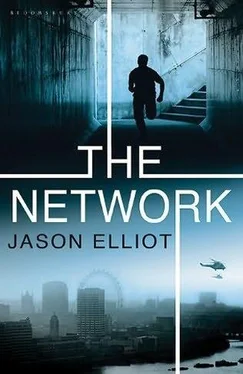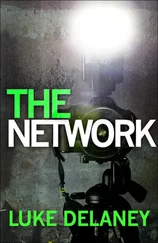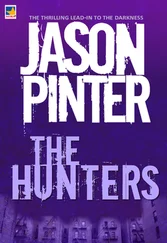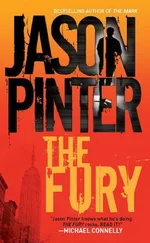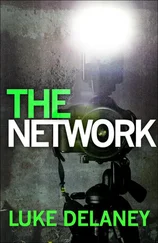Jason Elliot - The Network
Здесь есть возможность читать онлайн «Jason Elliot - The Network» весь текст электронной книги совершенно бесплатно (целиком полную версию без сокращений). В некоторых случаях можно слушать аудио, скачать через торрент в формате fb2 и присутствует краткое содержание. Жанр: Триллер, на английском языке. Описание произведения, (предисловие) а так же отзывы посетителей доступны на портале библиотеки ЛибКат.
- Название:The Network
- Автор:
- Жанр:
- Год:неизвестен
- ISBN:нет данных
- Рейтинг книги:4 / 5. Голосов: 1
-
Избранное:Добавить в избранное
- Отзывы:
-
Ваша оценка:
- 80
- 1
- 2
- 3
- 4
- 5
The Network: краткое содержание, описание и аннотация
Предлагаем к чтению аннотацию, описание, краткое содержание или предисловие (зависит от того, что написал сам автор книги «The Network»). Если вы не нашли необходимую информацию о книге — напишите в комментариях, мы постараемся отыскать её.
The Network — читать онлайн бесплатно полную книгу (весь текст) целиком
Ниже представлен текст книги, разбитый по страницам. Система сохранения места последней прочитанной страницы, позволяет с удобством читать онлайн бесплатно книгу «The Network», без необходимости каждый раз заново искать на чём Вы остановились. Поставьте закладку, и сможете в любой момент перейти на страницу, на которой закончили чтение.
Интервал:
Закладка:
There are several false alarms as the others strike stones, and we stop to probe the ground more closely. Then after about half an hour, which feels like a year, Momen announces quietly that he thinks he’s got something. I kneel beside him and take his bayonet and push it gently forward until it stops. The tip feels as if it’s moving against something smooth. I try from different angles and feel the same response at the correct distances. We’ve found one.
H comes up beside me. He’s sweating.
‘I’ll clear this one,’ I tell him. ‘Get everyone back inside the fort. Is the 82 ready?’ I don’t add the obvious ‘in case this doesn’t go quite the way we’re hoping’.
He looks down at the bayonet in the ground, then at me, and then nods as if he’s forgotten the question. He draws his forearm across his forehead.
‘Leave you to it,’ he says. ‘Try not to drop it on the way back.’
I hate to see him go. I find the perimeter of the mine and discover it’s circular and about a foot across. There don’t seem to be any others next to it or beneath it. It feels like it’s metal. I’m guessing it’s a Soviet TM-type because most of the other kinds have plastic outer housings, which feel different when you scrape against them with a probe. I calculate the centre and carefully begin to remove the earth until a portion of the dusty pressure plate appears.
There are six evenly spaced depressions on the plate. It occurs to me, at this unlikely moment, that they resemble the fingermarks that Italian bakers press into their dough when they’re making focaccia. Then I think how odd it would be to be blown up by this mine in particular after having come all the way to Afghanistan, because it’s not a Soviet mine. It’s a British-made Second World War-era Mark 7.
The body is made of sheet steel with a domed upper surface, and it uses a Number 5 single- or double-impulse fuse. It can be fitted with an anti-lift device, but they’re rare, which is good. The mine’s weight makes it easy to booby-trap, which is bad. It contains twenty pounds of high-explosive TNT, or roughly the equivalent of sixty hand grenades.
I scrape away the soil from the upper part, working slowly down, watching the drops of sweat from my forehead fall onto the plate to create dark stains in the dust. The drops fall as if in slow motion and seem unnaturally large, though I know they’re not. I reveal the circular upper edge of the mine. I want only to know what’s underneath it, as a man wants to know the future, which, although closer to him at every moment than he ever suspects, is impenetrable.
I have a strange feeling as if I’m passing through a door, beyond which time no longer behaves in the usual way. I see the point of the bayonet pushing into the dirt around the mine and my hands tugging at the loosened debris. I see the tiny particles of dust swirl across my skin and tumble down in microscopic spirals of air onto the hairs on the backs of my hands like drowning sailors clinging gratefully to wreckage. I see blood appear under my fingertips, creeping along the curve of my nails as I claw into the rocky soil, only it seems that the blood is a flash flood in high summer driving across a boulder-filled canyon. There is more life compressed into these microscopic worlds than I have ever suspected, and for a few moments I’ve been carried into the full drama of their existence.
I reach under the mine to feel whether there’s anything sinister there and sense the weight of the metallic structure resting patiently on the earth waiting to corrode into its component elements, and all the passions and mysteries that can ever be known seem to have let me into their invisible secrets. They are all there, like a silent film we can’t see or hear, but they’re there all the same.
There’s no second mine or anti-lift device. As I lift the mine and it comes free I hear the sound of my own breath, and the world is back to its ordinary self. I have no idea how much time has passed and look back to the fort, where H is standing on the nearest turret, giving me an on-the-double hand signal like a steam-train driver pulling frantically on his whistle.
I run back and the men greet me like a long-lost friend with pats on my back.
‘It’s like working for the United Nations,’ I say. ‘We drive a German car to an Afghan fort to blow up American missiles with a British mine.’
‘And decide on it by a Chinese parliament,’ says H, using the SAS term for a meeting that involves all ranks. ‘Can you get the det out?’
‘One does rather hope so,’ I say in my best officer’s accent.
There’s a depression on the cover plate like the head of a screw, which I now attempt to loosen with the screwdriver on the Leatherman which Grace gave me. The plate doesn’t budge, so I add a little pressure, and the body of the mine slips along the ground. H sinks to his knees and holds it firm while I try again.
I’m fairly sure that I can’t exert enough force on the plate to set off the mine, but it’s not a pleasant feeling. It would be a shame to have come this far only to blow ourselves up by pushing too hard. I lean over the mine and grip the Leatherman with both hands and turn as hard as I can, while H uses his forearms to push in the opposite direction. I hear a strange growl of exasperation escape my mouth, and I’m almost oblivious now to the consequence of pushing against the plate with all my strength.
Then there’s a sudden metallic cracking noise as the screwdriver snaps. Our heads knock together with such force that my vision darkens for a second, and little sparks seem to be spilling in front of my eyes, prompting me to wonder whether we’ve been killed. Then the light pours in again, and we’re both staring at the top of the mine. The pressure plate is free.
I’ve never known such a roller coaster of emotions. We’re alive, but as I lift the mine fuse free I realise it’s integral to the plate and can’t be separated.
‘I don’t think this is going to work,’ I say.
‘Tell me you’re joking,’ says H quietly.
We can’t spend more time hoping to improvise a solution. It’s six hours since we released the Talib guard, and we must assume that before long he’ll make it back to the post where he originally joined us and report to his commander. We make a brutal calculation. We have already passed our cut-off time.
I feel sick.
‘Then let’s get the mortar on the truck,’ says H grimly.
And just as our hopes fall to their lowest ebb, with a precision that renews and affirms a private notion that all things are inevitably connected a shout goes up from the guard who’s keeping watch in the southern turret. We turn and see him waving frantically, so H and I run up and join him in the curve of the wall, which resembles the conning tower of a submarine, and follow the line of his outstretched arm to the floor of the valley.
‘We’ve got company,’ says H, reaching for the Kite sight in his map pocket. He flips open the covers, rests it on the dusty lip of the wall and brings his eye forward. ‘Jesus Christ,’ he says. ‘I thought you said he was only going to bring his bodyguards.’
‘That’s what he told me.’
‘That’s a lot of bodyguards.’ He hands me the Kite.
‘We might need to revise the plan,’ I agree because not even in the emergency plan that I made with Manny is there a scenario like this one. For a moment I can’t prevent the thought that perhaps Manny has betrayed us, and involuntarily picture myself having to shoot him. Then I hear the voice of the Baronness and the story of Ali and the knight, and the feeling of dread is lifted.
Below us, at the mouth of the valley about a mile away, there are six pickup trucks travelling at speed, throwing up pale clouds of dust in their wakes. There are at least half a dozen armed men in the back of each one. It won’t take them more than fifteen minutes to reach us. I pass the Kite to the guard, who peers intently into the viewfinder then turns back to us.
Читать дальшеИнтервал:
Закладка:
Похожие книги на «The Network»
Представляем Вашему вниманию похожие книги на «The Network» списком для выбора. Мы отобрали схожую по названию и смыслу литературу в надежде предоставить читателям больше вариантов отыскать новые, интересные, ещё непрочитанные произведения.
Обсуждение, отзывы о книге «The Network» и просто собственные мнения читателей. Оставьте ваши комментарии, напишите, что Вы думаете о произведении, его смысле или главных героях. Укажите что конкретно понравилось, а что нет, и почему Вы так считаете.
